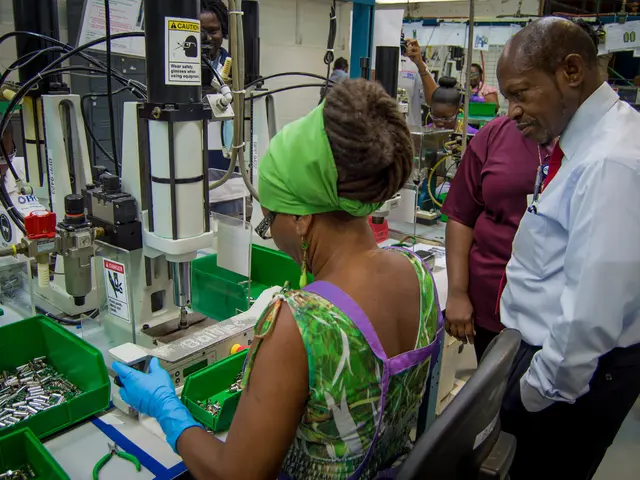Workplace safety: Identifying EU nations with the highest rates of work-related fatalities and injuries.
People still getting hurt on the job in Europe, but improvements seen
Let's chat about work accidents and fatalities in Europe while we celebrate Labour Day. Eurostat figures show a decrease of 5% in work accidents between 2017 and 2022, but it's worth noting that more than a third of European countries no longer meet the ILO's standard of one labor inspector per 10,000 workers.
In 2022, there were 2.97 million non-fatal work accidents and 3,286 fatal work-related accidents in the EU, giving a ratio of around 905 non-fatal accidents for every fatal accident. However, men were more likely than women to have a work accident, with two out of every three non-fatal accidents in the EU involving men.
The manufacturing, human health and social work activities, and construction sectors recorded the highest number of accidents in 2022, but the good news is that there were fewer accidents among men in the EU compared to 2021. Yet, the number went up for women, with 87,929 more accidents reported.
Across the EU, there were 1.66 fatal accidents per 100,000 employed people in 2022. The highest rate of fatal accidents at work was recorded in Malta, France, and Bulgaria. On the other hand, the lowest rate was seen in the Netherlands, Greece, Germany, Sweden, and Ireland.
When it comes to non-fatal accidents, Denmark, France, Portugal, and Spain registered the highest rates, while Romania and Bulgaria had the lowest incidence rates among EU countries. The most common injuries included wounds and superficial injuries, dislocations, sprains, and strains.
Labor inspectors play a vital role in ensuring a safe work environment and decent working conditions for all. However, there's a concerning trend as the number of these professionals has decreased worldwide since 2009, while employment increased. More than a third of European countries no longer meet the ILO's standard of one labor inspector per 10,000 workers.
Countries like Germany, France, and Spain have fewer labor inspectors compared to the workforce size, and the effectiveness of labor inspections is a concern in regions where this standard is not met. Increasing the number of labor inspectors to adhere to the ILO standard is essential to prevent workplace accidents and injuries proactively across the EU.
Sources:[1] ILOSTAT Data [https://ilostat.ilo.org/app/main/index.html][2] Eurostat Data [https://ec.europa.eu/eurostat/web/database][3] ETUC Research [https://www.etuc.org/]
Related:- Why does France hold the record for accidents in the workplace?- Low-wage earners: Where is it least profitable to work in Europe?- Which EU countries have the highest and lowest hourly labor costs?- Working in Europe: How can social mobility boost the continent's economy?
worker fatalitiesworkWork accidents
- Eurostat data reveals a 5% decrease in work accidents from 2017 to 2022, but it's concerning that more than a third of European countries do not meet the ILO standard of one labor inspector per 10,000 workers.
- Despite the decrease, work accidents and fatalities remain a concern in various industries such as manufacturing, human health and social work activities, and construction, with men being more susceptible to accidents.
- Improving workplace-wellness through enhancing health-and-wellness measures, essential in the industry, finance, and business sectors, could possibly minimize work-related accidents and fatalities.
- Science and research can provide valuable insights and solutions to mitigating work-related accidents and injuries, thereby ensuring a safer work environment for all employees in the European Union.
- Accessibility to resources and support for addressing work-related dislocations, rehabilitation of victims, and prevention measures must be prioritized by governments, industries, and social welfare organizations to improve labour conditions across Europe.










